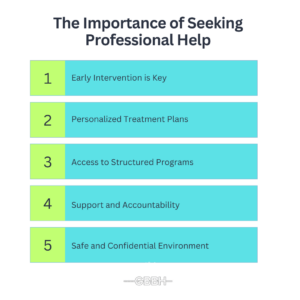Just like physical health, mental health can be affected by various factors, leading to disorders that impact daily life. Knowing what these disorders are can help us find mental health treatment and support. In this post, we will explore five common mental health disorders, their symptoms, and treatment options available, including different mental health programs.
1. Anxiety Disorders
Anxiety disorders are among the most common mental health issues, impacting around 40 million adults in the U.S. each year. While everyone experiences anxiety at times, anxiety disorders are marked by persistent, intense worry that interferes with daily life. Common forms of anxiety disorders include generalized anxiety disorder (GAD), social anxiety disorder, panic disorder, and specific phobias.
Symptoms:
- Excessive Worry: Persistent anxiety about everyday activities or events.
- Physical Symptoms: Sweating, racing heart, shaking, and muscle tension.
- Avoidance Behavior: Avoiding places or situations that may trigger anxiety.
- Difficulty Concentrating: Preoccupation with worry can disrupt focus.
Treatment Options: Cognitive-Behavioral Therapy (CBT) is a leading treatment for anxiety disorders, helping individuals challenge and reframe anxious thoughts. Dialectical Behavior Therapy (DBT) can assist in managing overwhelming emotions, while Acceptance and Commitment Therapy (ACT) encourages acceptance of anxious thoughts and teaches skills to improve emotional resilience. Mental Health Therapy Programs at a Mental Health Treatment Center in Massachusetts often include Group Therapy Programs and Intensive Outpatient Programs tailored to address different forms of anxiety.
2. Depression
Depression affects millions of people globally, impacting how they feel, think, and handle daily activities. It often involves prolonged sadness and loss of interest in previously enjoyable activities. Beyond sadness, depression also includes physical symptoms and impacts overall energy and motivation.
Symptoms:
- Persistent Sadness: Low mood and feelings of emptiness or hopelessness.
- Anhedonia: Loss of interest in hobbies and activities once enjoyed.
- Changes in Sleep and Appetite: Insomnia or oversleeping, increased or decreased appetite.
- Fatigue and Low Energy: Even small tasks feel exhausting.
- Difficulty Concentrating: Slowed thinking, indecision, and forgetfulness.
Treatment Options: Cognitive-Behavioral Therapy (CBT) helps address and replace negative thought patterns associated with depression. Dialectical Behavior Therapy (DBT), often used in combination with CBT, supports emotional regulation and distress tolerance. Group Therapy Programs allow individuals to connect and share experiences with others facing similar challenges, while an Intensive Outpatient Program (IOP) or Partial Hospitalization Program (PHP) provides structure for those needing more intensive care. Facilities like Greater Boston Behavioral Health offer comprehensive options tailored to individual needs.
3. Bipolar Disorder
Bipolar disorder is characterized by mood swings that range from depressive lows to manic or hypomanic highs. These shifts in mood, energy, and behavior can be intense and disruptive, affecting work, relationships, and overall wellbeing. It can be categorized into Bipolar I, Bipolar II, and Cyclothymic Disorder, each varying in the intensity and duration of mood episodes.
Symptoms:
- Manic Episodes: High energy, reduced need for sleep, impulsive behavior, and a feeling of euphoria or irritability.
- Hypomanic Episodes: Similar to mania but less severe; often experienced in Bipolar II.
- Depressive Episodes: Persistent sadness, low energy, loss of interest, feelings of guilt, or worthlessness.
- Rapid Cycling: Some individuals experience frequent mood shifts within a year, adding complexity to the disorder.
Treatment Options: Management of bipolar disorder usually includes medication to stabilize moods, coupled with therapy. Dialectical Behavior Therapy (DBT) is particularly useful in managing the emotional intensity associated with mood swings, while Cognitive-Behavioral Therapy (CBT) can assist with recognizing and modifying thought patterns that lead to emotional extremes. Many individuals benefit from a structured Partial Hospitalization Program (PHP) or Intensive Outpatient Program (IOP) to develop and maintain coping skills during active episodes.
4. Post-Traumatic Stress Disorder (PTSD)
PTSD develops after experiencing or witnessing a traumatic event, such as a natural disaster, accident, or personal assault. Individuals with PTSD often relive the trauma through flashbacks or nightmares and may experience severe anxiety. PTSD can also lead to feelings of numbness, emotional detachment, and a heightened state of arousal.
Symptoms:
- Re-Experiencing the Trauma: Flashbacks, nightmares, or intrusive memories.
- Avoidance: Avoiding places, people, or activities that remind them of the trauma.
- Hypervigilance: Constantly feeling on edge, irritability, and difficulty sleeping.
- Emotional Numbness: Feeling detached from others and experiencing a lack of emotional response.
Treatment Options: Trauma Therapy Programs are specifically designed to treat PTSD. Eye Movement Desensitization and Reprocessing (EMDR) is a highly effective therapy that reduces the distress associated with traumatic memories. Cognitive-Behavioral Therapy (CBT) can help individuals process trauma-related thoughts and feelings, while Dialectical Behavior Therapy (DBT) offers tools for managing intense emotions. Group Therapy Programs also provide a safe space for individuals to share their experiences with others who understand their struggles.
5. Obsessive-Compulsive Disorder (OCD)
OCD is characterized by intrusive, distressing thoughts (obsessions) and repetitive behaviors or rituals (compulsions) that a person feels driven to perform to reduce anxiety. OCD can range from mild to severe and, if untreated, can significantly disrupt daily functioning.
Symptoms:
- Obsessions: Persistent, unwanted thoughts (e.g., fear of germs, safety concerns).
- Compulsions: Repetitive actions (e.g., excessive handwashing, checking locks) aimed at reducing anxiety.
- Distress and Impairment: Symptoms cause significant distress and interfere with daily life.
Treatment Options: Cognitive-Behavioral Therapy (CBT), especially Exposure and Response Prevention (ERP), is considered the gold-standard treatment for OCD, as it helps individuals confront their fears and reduce compulsive behaviors. Acceptance and Commitment Therapy (ACT) can also help individuals accept their thoughts without engaging in compulsions. Dialectical Behavior Therapy (DBT) offers strategies for regulating emotions, which can be helpful for individuals with severe OCD. Many Mental Health Treatment Centers in Massachusetts provide Intensive Outpatient Programs and Partial Hospitalization Programs that cater specifically to those with OCD, providing structured support.
The Importance of Seeking Professional Help
Mental health disorders affect individuals uniquely, and symptoms can vary widely. Seeking help from a Mental Health Treatment Center in Massachusetts offers a variety of treatment options and therapies designed to address specific needs. Programs like Mental Health Therapy Programs, Intensive Outpatient Programs (IOP), and Partial Hospitalization Programs (PHP) are tailored to provide flexible levels of care, from comprehensive day programs to structured outpatient support.
With options such as Cognitive-Behavioral Therapy (CBT), Dialectical Behavior Therapy (DBT), Acceptance and Commitment Therapy (ACT), and EMDR Therapy, individuals can access the tools and skills they need to manage symptoms, improve their quality of life, and achieve lasting recovery. Addressing mental health concerns early and with the appropriate care plan can lead to significant positive changes, helping individuals reclaim control over their mental and physical wellbeing.
Conclusion
Mental health disorders can affect anyone, but understanding them is the first step toward seeking help. Treatment options like cognitive-behavioral therapy, dialectical behavior therapy, and Acceptance and Commitment Therapy are effective in managing these disorders.
If you or someone you know is struggling with a mental health disorder, consider reaching out to a mental health treatment center in Massachusetts. These centers often offer a variety of mental health therapy programs, including group therapy programs and trauma therapy programs.
For comprehensive care, the Greater Boston Behavioral Health Center provides a range of services to support individuals in their journey toward mental wellness. Their dedicated team focuses on personalized treatment plans to ensure that each patient receives the help they need to lead fulfilling lives. Seeking support after all, is a courageous step, and resources are available to assist in overcoming challenges. Call us at (888)278-0716 today to learn more about our services and how we can help you on your journey to recovery!
FAQ on Common Mental Health Disorders
What are the five most common mental health disorders?
The five most common mental health disorders are depression, anxiety disorders, bipolar disorder, obsessive-compulsive disorder (OCD), and post-traumatic stress disorder (PTSD). Each affects individuals differently, with unique symptoms and treatment approaches.
How can therapy help with these mental health disorders?
Therapies such as Cognitive Behavioral Therapy (CBT), Dialectical Behavior Therapy (DBT), Acceptance and Commitment Therapy (ACT), and EMDR provide tailored approaches to managing symptoms, helping individuals develop coping strategies and improve emotional well-being.
What are the first signs that someone might have a mental health disorder?
Early signs often include persistent sadness, overwhelming anxiety, mood swings, difficulty concentrating, changes in sleep patterns, and withdrawal from friends or activities. Recognizing these signs and seeking support can help manage symptoms early.
How can a Mental Health Treatment Center in Massachusetts support individuals with these disorders?
A mental health treatment center offers structured programs like Intensive Outpatient Programs (IOP), Partial Hospitalization Programs (PHP), and group therapy. These provide individuals with tailored support, professional care, and a community environment for recovery.
Can mental health disorders be treated without medication?
Yes, many mental health disorders can be managed with therapy alone, particularly with therapies like CBT and DBT. However, medication is sometimes recommended alongside therapy for more severe symptoms, depending on individual needs.


